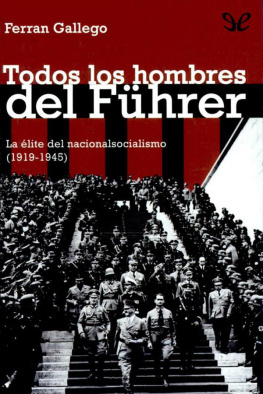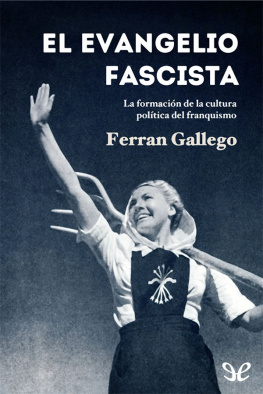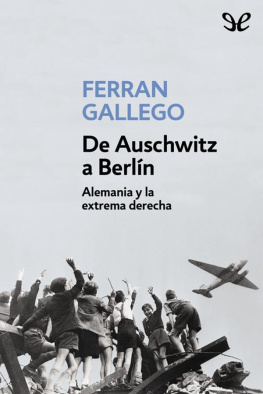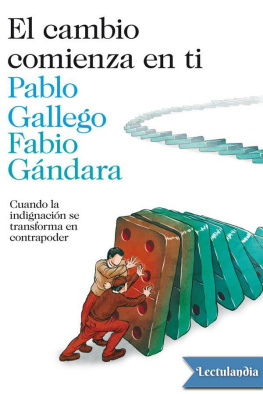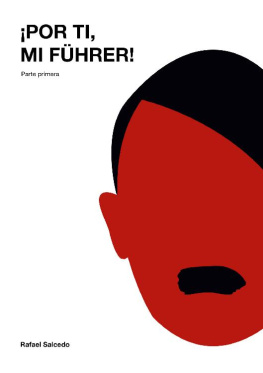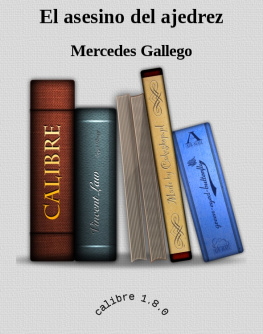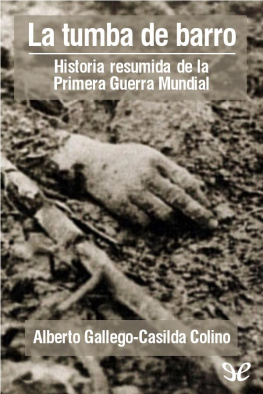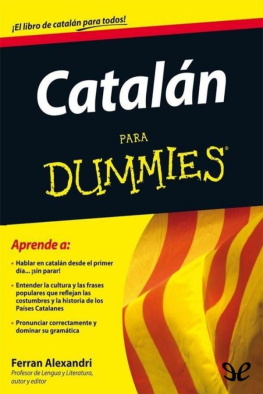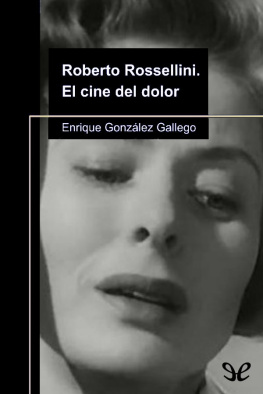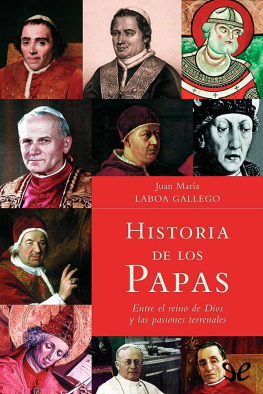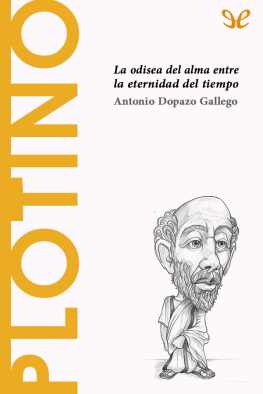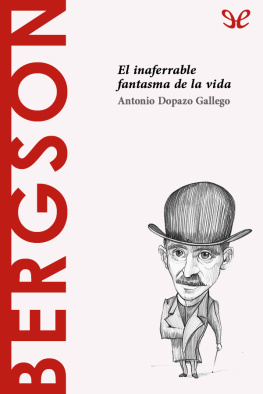Ferran Gallego - Todos los hombres del Führer
Aquí puedes leer online Ferran Gallego - Todos los hombres del Führer texto completo del libro (historia completa) en español de forma gratuita. Descargue pdf y epub, obtenga significado, portada y reseñas sobre este libro electrónico. Año: 2006, Editor: ePubLibre, Género: Historia. Descripción de la obra, (prefacio), así como las revisiones están disponibles. La mejor biblioteca de literatura LitFox.es creado para los amantes de la buena lectura y ofrece una amplia selección de géneros:
Novela romántica
Ciencia ficción
Aventura
Detective
Ciencia
Historia
Hogar y familia
Prosa
Arte
Política
Ordenador
No ficción
Religión
Negocios
Niños
Elija una categoría favorita y encuentre realmente lee libros que valgan la pena. Disfrute de la inmersión en el mundo de la imaginación, sienta las emociones de los personajes o aprenda algo nuevo para usted, haga un descubrimiento fascinante.
- Libro:Todos los hombres del Führer
- Autor:
- Editor:ePubLibre
- Genre:
- Año:2006
- Índice:5 / 5
- Favoritos:Añadir a favoritos
- Tu marca:
- 100
- 1
- 2
- 3
- 4
- 5
Todos los hombres del Führer: resumen, descripción y anotación
Ofrecemos leer una anotación, descripción, resumen o prefacio (depende de lo que el autor del libro "Todos los hombres del Führer" escribió él mismo). Si no ha encontrado la información necesaria sobre el libro — escribe en los comentarios, intentaremos encontrarlo.
Todos los hombres del Führer — leer online gratis el libro completo
A continuación se muestra el texto del libro, dividido por páginas. Sistema guardar el lugar de la última página leída, le permite leer cómodamente el libro" Todos los hombres del Führer " online de forma gratuita, sin tener que buscar de nuevo cada vez donde lo dejaste. Poner un marcador, y puede ir a la página donde terminó de leer en cualquier momento.
Tamaño de fuente:
Intervalo:
Marcador:
Abel, T., Why Hitler Came into Power, Cambridge, Massachusetts, 1986.
Abraham, D., The Collapse of Weimar Republic. Political Economy and Crisis, Nueva York, 1986.
Ackermann, J., Heinrich Himmler als Ideologe, Göttingen, 1970.
Adorno, T., «Antisemitismo y propaganda fascista», en Obra completa, vol. 8, Madrid, 2004.
Agamben, G., Lo que queda de Auschwitz. El archivo y el testigo. Homo sacer III, Valencia, 2000.
Aly, G., y S. Heym, Architects of Annihilation. Auschwitz and the Logia of Destruction, Londres, 2002.
Aly, G., Hitlers Volksstaat. Raub, Rassenkrieg und nationaler Sozialismus, Frankfurt, 2005.
Andreassi, A., «Arbeit macht Frei». El trabajo y su organización en el fascismo (Alemania e Italia), Barcelona, 2004.
Antezana Ergueta, L., Historia secreta del Movimiento Nacionalista Revolucionario, La Paz, 1984.
Arendt, H., Ensayos de comprensión, 1930-1954, Madrid, 2005.
Aronson, S., The Beginnings of the Gestapo System. The Bavarian model in 1933, Jerusalén, 1969.
—, Reinhard Heydrich und die Frühgeschichte von Gestapo und SD, Stuttgart, 1971.
Aschheim, S., The Nietzsche Legacy in Germany, 1890-1900, Berkeley, 1992.
Auerbach, H., «Hitlers politische Lehjahre und die münchener Gesellschaft 1919-1923. Versuch einer Bilanz anhand neueren Forschung», en Vierteljahrshefte für Zeitgeschichte, 25 (1977), pp. 1-45.
Ayçoberry, P., La societé allemande sous le III Reich, París, 1998.
Banach, J., Heydrichs Elite. Das Führerkorps der Sicherheitspolizei und des SD, 1936-1945, Paderborn, 1998.
Bankier, D., The Germans and the Final Solution. Public Opinion under Nazism, Cambridge, 1992.
Baranowsky, S., The Sanctity of Rural Life, Nobility, Protestantism and Nazism in Weimar Prusia, Nueva York, 1995.
—, «Nacionalismo radical en el contexto internacional. “Fuerza por la Alegría” y las paradojas del turismo nazi», Historia Social, 52 (2005), pp. 93-108.
Barskai, A., Nazi Economics. Ideology, Theory, and Policy, Oxford, 1990.
Bartov, O., The Eastern Front, 1941-1945, German Troops and the Barbarisation of Warfare, Londres, 1985.
—, Hitler’s Army. Soldiers, Nazis, and War in the Third Reich, Nueva York, 1992.
—, Germany’s War and the Holocaust. Disputed Histories, Ithaca, 2003.
Bartsch, G., Zwischen drei Stühlen. Otto Strasser: eine Biographie, Coblenza, 1990.
Baumann, Z., Modernidad y holocausto, Toledo, 1989.
—, Life in Fragments. Essays in Postmodern Morality, Oxford, 1995,
—, La posmodernidad y sus descontentos, Madrid, 2001.
Baur, J., Die russische Kolonie in München, 1900-1945. Deutsch-russische Beziehungen im 20. Jahrhundert, Wiesbaden, 1998.
Bayón, F., La prohibición del amor. Sujeto, cultura y forma artística en Thomas Mann, Barcelona, 2004.
Becker, P., «Fritz Sauckel. Plenipotentiary for de Mobilisation of Labour», en R. Smelser y R. Zitelmann, eds., The Nazi Elite, Londres, 1993, pp. 194-201.
Benjamin, W., «Tesis de Filosofía de la Historia», en Discursos interrumpidos, I, Madrid, 1973.
Bennecke, H., Hitler und die SA, Munich, 1962.
—, Die Reichswehr und der «Röhm Putsch», Munich, 1964.
Bergen, D. L., Twisted Cross. The German Christian Movement in the Third Reich, Chapel Hill, 1996.
Berghahn, V., «Die Harzburger Front und die Kandidatur Hindenburgs für die Präsidentschaftswählen 1932», Vierteljarhrshefte für Zeitgeschichte, 13 (1965), pp. 64-82.
Bering, D., The Stigma of Names. Antisemitism in German Daily Life, 1812-1933, Cambridge, 1992.
Berlekamp, B., y W. Röhr, eds., Terror, Herrschaft und Alltag im Nationalsozialismus. Probleme einer Sozialgeschichte des deutschen Faschismus, Munster, 1999.
Bessel, R., Political Violence and the Rise of Nazism. The Stormtroopers in Eastern Germany 1925-1934, New Haven, 1984.
—, Germany after the First World War, Oxford, 1993.
Black, P., Ernst Kaltenbrunner. Ideological Soldier of the Third Reich, Princeton, 1984.
Bleuel, H. P., Sex and Society in Nazi Germany, Nueva York, 1973.
Bloch, C., Die SA un die Krise des nationalsozialistische Regimes, 1934, Frankfurt, 1970.
Bloch, E., Erbschaft dieser Zeit, Frankfurt, 1962.
Boelcke, W., ed., Deutschlands Rüstung im Zweiten Weltkrieg. Hitlers Konferenzen mit Albert Speer, 1942-1945, Frankfurt, 1969.
Bologna, S., Nazismo y clase obrera, 1933-1993, Madrid, 1999.
Bollmus, R., «Alfred Rosenberg. National Socialism’s “Chief Ideologue”?», en R. Smelser y R. Zitelmann, eds., The Nazi Elite, Londres, 1993, pp. 183-193.
Bormann, M., Memorias, Barcelona, 1954.
Bracher, K. D., Die Auflösung der Weimarer Republik, Düsseldorf, 1984 (1.ª ed. de 1955).
—, La dictadura alemana. Génesis, estructura y consecuencias del nacionalsocialismo, Madrid, 1972.
Bracher, K. D., G. Schulz y W. Sauer, Die nationalsozialistische Machtergreifung, Frankfurt, 1960.
Bramsted, E. K., Goebbels and National Socialist Propaganda, 1925-1945, East Lansing, 1965.
Bramwell, A., Blood and Soil. Walther Darré and Hitler’s «Green Party», Abbotsbrook, 1985.
Brandes, G., Nietzsche. Un ensayo sobre el radicalismo aristocrático, México, 2004.
Brauer, S., Anatomie de la Révolution conservatrice, París, 1996.
Breitman, R., The Architect of Genocide. Himmler and the Final Solution, Londres, 1991.
Broszat, M., «Die Anfänge der Berliner NSDAP 1926/1927», en Vierteljahrshefte für Zeitgeschichte, 8 (1960), pp. 85-118.
—, «Soziale Motivation und Führer-Bindung des Nationalsozialismus», Vierteljahrshefte für Zeitgeschichte, 18 (1970), pp. 394-409.
—, L’État hitlérien. L’origine et l’évolution des estructures du troisième Reich, París, 1985.
—, Hitler and the Collapse of Weimar Germany, Oxford, 1987.
Browder, G., Foundations of the Nazi Police State. The Formation of SIPO and SD, Lexington, 1990.
Browning, C., ed., The Path to Genocide. Essays on Launching the Final Solution, Cambridge, 1992.
—, Ordinary Men. Reserve Police Battalion 101 and the Final Solution in Poland, Nueva York, 1992.
—, The Origins of the Final Solution. The Evolution of Nazi Jewish Policy. September 1939-March 1942, Lincoln, 2004.
Brownlow, D. G., The Life and Times of Horst Wessel. Composer of the «Horst Wessel Lied», Hannover, Massachusetts, 1996.
Brüning, H., Memoiren 1918-1934, Stuttgart, 1970.
Brustein, W., The Logic of Evil. The Social Origins of the Nazi Party, 1925-1933, New Haven, 1996.
Buchheim, H., M. Broszat, H. J. Jacobsen y H. Krausnick, Anatomie des SS-Staates, Munich, 1994 (1.ª ed. en 1967).
Buck-Morris, S., Walter Benjamin, escritor revolucionario, Buenos Aires, 2005.
—, Dialéctica de la mirada. Walter Benjamin y el proyecto de los pasajes, Madrid, 1995.
Bukey, E. B., Hitler’s Austria. Popular sentiment in the nazi era, 1938-1945, Chapel Hill, 2000.
Bullock, A., Hitler, Barcelona, 1969.
Bullock, M. P., The Violent Eye. Ernst Jünger’s Visions and Revisions on the European Right, Detroit, 1992.
—, Death and deliverance. «Eutanasia» in Germany, 1900-1945, Cambridge, 1994.
—, «“See you again in Siberia”. The German-Soviet War and Other Tragedies», en Ethics and Extermination. Reflections on Nazi Genocide, Cambridge, 1997.
—, Germany Turns Eastwards. A Study of Ostforschung in the Third Reich
Tamaño de fuente:
Intervalo:
Marcador:
Libros similares «Todos los hombres del Führer»
Mira libros similares a Todos los hombres del Führer. Hemos seleccionado literatura similar en nombre y significado con la esperanza de proporcionar lectores con más opciones para encontrar obras nuevas, interesantes y aún no leídas.
Discusión, reseñas del libro Todos los hombres del Führer y solo las opiniones de los lectores. Deja tus comentarios, escribe lo que piensas sobre la obra, su significado o los personajes principales. Especifica exactamente lo que te gustó y lo que no te gustó, y por qué crees que sí.

